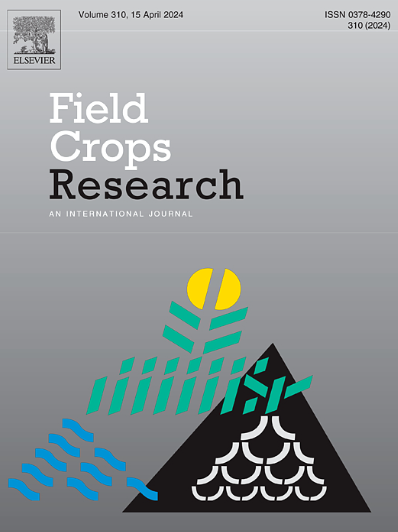在集约化好氧水稻系统中,沸石改性提高了粮食产量,减轻了温室气体排放
IF 5.6
1区 农林科学
Q1 AGRONOMY
引用次数: 0
摘要
强化好氧水稻系统(IIARS)可以提高水稻的水分利用效率和减少甲烷(CH4)排放,但可能会导致水稻减产和氮氧化物(N2O)的排放。因此,需要生态高效的战略来维持水稻产量,同时减少与农业农业相关的环境负担。沸石是一种很有前途的土壤调理剂,可以提高水稻产量,减少温室气体排放。然而,沸石改性如何影响水稻产量以及IIARS中CH4和N2O的排放仍然是一个谜。本研究通过为期两年的田间试验,研究了沸石改性对连续漫灌(ICF)和IIARS条件下水稻产量、灌溉投入、水分利用效率、CH4和N2O排放、全球变暖潜势(GWP)以及氧化还原电位(Eh)、pH、NH4+和NO3−等相关土壤参数的影响。我们发现,与ICF相比,IIARS显著减少了65 - 80% %的CH4排放,但增加了35-239 %的N2O排放。值得注意的是,与非沸石对照相比,在IIARS条件下,添加沸石分别减少了8-45 %和13-22 %的CH4和N2O排放。因此,与非沸石对照相比,在IIARS条件下,沸石改性显著降低了10-38 %的GWP。同时,与ICF相比,IIARS在2022年的水稻产量显著提高了15 %,但在2023年的产量与ICF相当,沸石改性导致2022年和2023年的水稻产量分别较非沸石对照显著提高了7 %和8 %。沸石改性处理降低了土壤的GWP值,提高了水稻产量,其主要原因是降低了土壤NH4+浓度,增加了NO3−浓度。因此,利用沸石对IIARS水田进行土壤改良是一种环境可持续性和保障粮食安全的最佳策略。本文章由计算机程序翻译,如有差异,请以英文原文为准。
Zeolite amendment enhances grain yield and mitigates greenhouse gas emissions in an intensive aerobic rice system
Intensive aerobic rice system (IIARS) can enhance water use efficiency and mitigate methane (CH4) emissions, but it may decrease rice grain yields and stimulate nitrous oxide (N2O) emissions by incurring a water deficit. Therefore, eco-efficient strategies are required to maintain rice grain yields while reducing the environmental burden associated with IIARS. Zeolite is a promising soil conditioner for increasing rice yields and mitigating greenhouse gas emissions. However, how zeolite amendment affects rice grain yield and CH4 and N2O emissions in IIARS remains elusive. In this study, a two-year field experiment was conducted to elucidate the impacts of zeolite amendment on the rice grain yield, irrigation input, water use efficiency, CH4 and N2O emissions, global warming potential (GWP), and associated soil parameters, including redox potential (Eh), pH, NH4+, and NO3− under continuously flooded irrigation (ICF) and IIARS. We found that IIARS significantly mitigated CH4 emissions by 65–80 % but increased N2O emissions by 35–239 % relative to ICF. Notably, zeolite amendment mitigated CH4 and N2O emissions by 8–45 % and 13–22 % under IIARS, respectively, relative to the non-zeolite control. Accordingly, zeolite amendment significantly decreased the GWP by 10–38 % under IIARS compared with the non-zeolite control. Concurrently, IIARS significantly increased the rice grain yield by 15 % in 2022 but obtained an equivalent yield in 2023 compared with ICF, and zeolite amendment resulted in significant increases in rice grain yields of 7 % and 8 % in 2022 and 2023, respectively, relative to the non-zeolite control. The lower GWP and higher rice grain yield observed under zeolite-amendment treatment can be attributed to the reduced soil NH4+ and increased NO3− concentrations. Consequently, soil amendment with zeolite in IIARS paddy fields is an optimal strategy regarding environmental sustainability and safeguarding food security.
求助全文
通过发布文献求助,成功后即可免费获取论文全文。
去求助
来源期刊

Field Crops Research
农林科学-农艺学
CiteScore
9.60
自引率
12.10%
发文量
307
审稿时长
46 days
期刊介绍:
Field Crops Research is an international journal publishing scientific articles on:
√ experimental and modelling research at field, farm and landscape levels
on temperate and tropical crops and cropping systems,
with a focus on crop ecology and physiology, agronomy, and plant genetics and breeding.
 求助内容:
求助内容: 应助结果提醒方式:
应助结果提醒方式:


